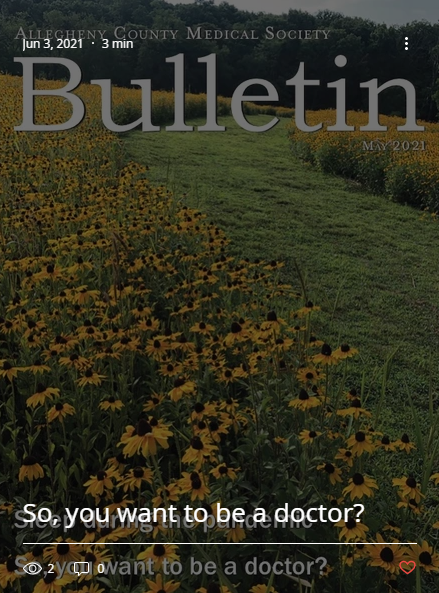
My father, a salesman, liked to tell this joke to his customers:
At the inauguration of a U.S. president, a man in the audience turns to the man next to him and starts a conversation:
“You see the man up there?”
“Yes, that’s the next president.”
“Well, he is my son!”
“You must be very proud”
“Well course, I am, his brother is A DOCTOR!”
My mother took a more somber view of my accomplishment. She was born in Vienna in the 1930s, and her hope for a career in medicine ended as a consequence of World War II. Instead, she passed on her passion for medicine to myself who became a psychiatrist and my brother who entered neurology.
I am asked frequently to preceptor pre-medical college students and discuss their career choice. The advice and direction I give them is so succinct and zen-like it seems to lack any guidance at all. I tell them, “The only reason to become a doctor is if you want to be a doctor.” If they are quizzical and question me further, I explain: “Do not spend the considerable amount of time, study and money to become a doctor for any other reason, not the perceived income, not the desired prestige, not for any other reason, except to spend your life practicing medicine in whatever form medicine will take in the future.” This perspective comes from my own experience and journey.
It was 15 years from the time I decided to enroll in pre-medical studies to the time I saw my first patient as a licensed, practicing physician in an Appalachian community working in the U.S. Public Health Service. I was inspired to become a doctor, specifically a psychiatrist, after reading “The Fifty Minute Hour,” a collection of classic psychoanalytic case studies by Robert Linder, a psychoanalyst. This inspiration had no place in the U.S. Public Health Service community mental health center, where the need was to medicate schizophrenics and bipolar patients and keep depressed and anxious patients out of the hospital. Furthermore, Prozac and Zoloft had been recently introduced to the clinical market, psychiatry irrevocably changed, and my entire training became seemingly inconsequential. What was once a field of case formulation, psychotherapies and inpatient treatments marked by tedious laboratory and medical workups to start tricyclic antidepressants became a burgeoning outpatient field with an increasing emphasis and eventual reorientation to a medical and biological model.
Prozac had recast psychiatry in 1986 the way Penicillin changed internal medicine in 1942. So, the field of medicine I thought I was entering and was trained in was altogether different at the end of the process, 15 years later. I adapted and have become an apt clinical psychiatrist in both psychopharmacology and psychotherapy.
In medicine, expeditious change has become common and assumed. Cures are expected; innovation is demanded. Developments have encompassed the commerce of treatment and the analysis of care. The way psychiatrists are paid has changed from cash, $50 for an analytic hour in 1974, to an array of insurance plan reimbursements. Managed care and actuary-driven models are imposed on clinical skill, intuition and judgment. The medical system is periodically dismissed as broken or overwhelmingly complicated. So, for a student contemplating a career as a doctor, it is not possible to know what it will actually mean to be a doctor in the 15 to 20 years the education will take.
But, as I also tell those who ask me, despite the inevitability of change in medicine and the unknowingness of the outcome of a medical education, one thing is certain for any prospective doctor: There will always be the need for healers, and there will always be those who need their help.

